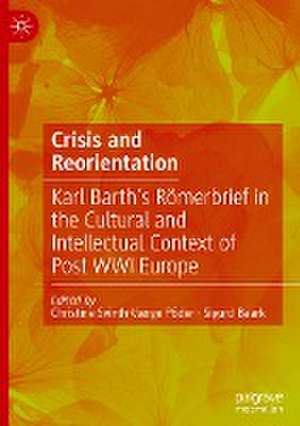Crisis and Reorientation: Karl Barth’s Römerbrief in the Cultural and Intellectual Context of Post WWI Europe
Editat de Christine Svinth-Værge Põder, Sigurd Baarken Limba Engleză Hardback – 23 iun 2023
Preț: 946.72 lei
Preț vechi: 1154.54 lei
-18% Nou
Puncte Express: 1420
Preț estimativ în valută:
181.18€ • 187.17$ • 150.79£
181.18€ • 187.17$ • 150.79£
Carte tipărită la comandă
Livrare economică 26 martie-09 aprilie
Preluare comenzi: 021 569.72.76
Specificații
ISBN-13: 9783031276767
ISBN-10: 3031276760
Pagini: 259
Ilustrații: XIII, 259 p. 1 illus.
Dimensiuni: 148 x 210 mm
Greutate: 0.48 kg
Ediția:2023
Editura: Springer International Publishing
Colecția Palgrave Macmillan
Locul publicării:Cham, Switzerland
ISBN-10: 3031276760
Pagini: 259
Ilustrații: XIII, 259 p. 1 illus.
Dimensiuni: 148 x 210 mm
Greutate: 0.48 kg
Ediția:2023
Editura: Springer International Publishing
Colecția Palgrave Macmillan
Locul publicării:Cham, Switzerland
Cuprins
1. Crisis and Reorientation – Introduction.- 2. Karl Barth’s Performative Theology: Context and Rhetorics in Der Römerbrief 1922.- 3. “As a tangent touching a circle”: Karl Barth and dialectical theologians rethinking time after 1918.- 4. Prophecy as a political–theological category in Barth’s Römerbrief?.- 5. From Answers to Questions: Barth and Thurneysen on Dostoyevsky.- 6. The Positive Role of Culture in Barth and Tillich’s Discussion of the Paradox in 1923.- 7. An Apocalyptic Tone: Karl Barth’s Der Römerbrief between neo-Kantian and hermeneutic paradigms of orientation.- 8. Revisiting the crisis theology of Karl Barth in light of Søren Kierkegaard in a new time of crisis.- 9. The Voice of the Preacher: Literary and Rhetorical Aspects of Der Römerbrief.- 10. A Literary Reception of Karl Barth’s Römerbrief: On Barthianism in John Updike’s Roger’s Version.- 11. “Theology After Gulag and Beyond”: How Can Karl Barth’s Theology Contribute to Reorientation in the Contemporary European Crisis? A post-Soviet Case.
Notă biografică
Christine Svinth-Værge Põder teaches Systematic Theology at the Univeristy of Copenhagen, Denmark. She is the author of Doxological Hiddenness. The Fundamental Theological Significance of Prayer in Karl Barth’s Work, (2009), and editor of Mellem tiderne - fem dialektiske teologer, (2015).
Sigurd Baark teaches Systematic Theology at the Faculty of Theology, University of Copenhagen, Denmark. He is the author of The Affirmations of Reason: on Karl Barth’s Speculative Theology (2018).
Textul de pe ultima copertă
This book uses Karl Barth’s Der Römerbrief (1922) as a prism through which to explore the role of religion and its interactions with cultural and political thought in the turbulent interwar period in Europe. One of the most influential books in twentieth-century protestant theology, Der Römerbrief found Barth arguing that the crisis of the time was grounded in an even more profound crisis that pertained to the human condition as such. While much research has been conducted on Der Römerbrief, most of it has focused on the book’s explicit theology. The aim of the present volume is to mark the centenary of this seminal book with a broader investigation into the movements of thought within Der Römerbrief and its reception and impact within its cultural and intellectual context. This broader approach by a range of Northern European researchers brings attention to interconnections between cultural and theological movements intimes of crisis.
Christine Svinth-Værge Põder teaches Systematic Theology at the Univeristy of Copenhagen, Denmark. She is the author of Doxological Hiddenness. The Fundamental Theological Significance of Prayer in Karl Barth’s Work, (2009), and editor of Mellem tiderne - fem dialektiske teologer, (2015).
Christine Svinth-Værge Põder teaches Systematic Theology at the Univeristy of Copenhagen, Denmark. She is the author of Doxological Hiddenness. The Fundamental Theological Significance of Prayer in Karl Barth’s Work, (2009), and editor of Mellem tiderne - fem dialektiske teologer, (2015).
Sigurd Baark teaches Systematic Theology at the Faculty of Theology, University of Copenhagen, Denmark. He is the author of The Affirmations of Reason: on Karl Barth’s Speculative Theology (2018).
Caracteristici
Investigates the movements of thought within Der Römerbrief and its mpact within its cultural and intellectual context Brings attention to interconnections between cultural and theological movements in times of crisis Includes contributions from researchers in literature, philosophy and cultural studies, as well as theology
